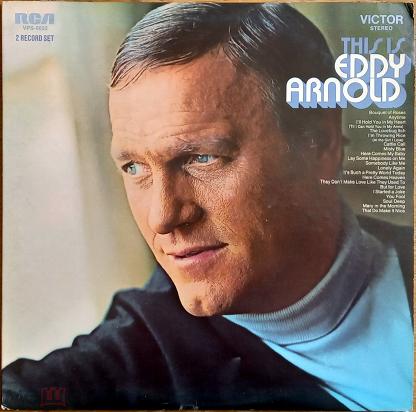
A heartfelt reflection on love’s regrets and quiet sorrows.
In the rich tapestry of country music, few voices have resonated with such profound sincerity and emotional depth as the legendary Eddy Arnold. With his timeless classic, “It’s a Sin,” Arnold captures the essence of regret, sorrow, and the lingering weight of past mistakes. Released initially in 1947 as a single under the iconic RCA Victor label, this poignant melody swiftly made its mark upon listeners’ hearts, climbing impressively to the number one position on Billboard’s Country & Western chart—holding steady for five consecutive weeks. It was a testament not only to Arnold’s tender vocal delivery but also to the universal truth hidden within its lyrical core.
Penned by Fred Rose and Zeb Turner, “It’s a Sin” delicately threads together feelings of remorse and personal reflection—a narrative that resonates deeply with those who have loved and lost, who have lived through life’s quieter heartaches. In this unforgettable song, Arnold’s velvety baritone voice gently carries listeners through the emotional landscape of regretful admissions and quiet introspection. One can almost picture the late evening shadows lengthening across an old porch, as an aging heart contemplates choices made in haste or passion—choices that may linger forever as unanswered questions or gentle reminders of human vulnerability.
Indeed, Eddy Arnold himself was no stranger to capturing life’s bittersweet truths. Often known affectionately as “The Tennessee Plowboy,” Arnold possessed a rare talent for translating complex emotions into melodies that felt deeply personal yet universally relatable. “It’s a Sin” exemplifies this remarkable gift; through simple yet profound lyrics, listeners are reminded of their own vulnerabilities—of moments when they may have faltered in judgment or allowed pride to overshadow compassion.
The song’s story unfolds quietly yet powerfully: it speaks about hurting someone dear, acknowledging one’s own faults openly, and bearing the heavy weight of guilt long afterward. As Arnold sings softly, “It’s a sin my darling how I love you / Because I know our love can never be,” we recognize immediately the tender paradox within these lines: love itself becomes both salvation and torment.
Over subsequent decades, “It’s a Sin” has been revisited by numerous artists—each attempting to capture anew the delicate balance between remorse and devotion originally captured so beautifully by Arnold. Yet none have surpassed the authenticity or emotional honesty offered by Eddy Arnold’s original rendition. His voice alone seems to hold within it generations’ worth of quiet griefs and wistful contemplation—a gentle reassurance that listeners are not alone in their struggles or regrets.
For many older listeners today, hearing this song evokes vivid memories from simpler times—perhaps recalling dusty vinyl records spinning lazily on Sunday afternoons, family gatherings warmed by gentle music in rural kitchens, or even solitary moments spent reflecting beneath starlit skies. There is an undeniable nostalgia woven into every note of this classic tune; it serves as a poignant reminder that life often leaves behind traces of sorrow mingled intimately with joy.
Ultimately, “It’s a Sin” remains more than just a popular country hit from long ago—it continues as a timeless meditation on human frailty and forgiveness. Whether one hears it for the first time today or recalls it fondly from youth gone by, Eddy Arnold’s heartfelt rendition stands steadfastly relevant—reminding each listener gently yet powerfully of love’s enduring complexities and life’s quiet sorrows.
